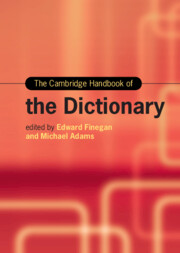Book contents
- The Cambridge Handbook of the Dictionary
- Cambridge Handbooks in Language and Linguistics
- The Cambridge Handbook of the Dictionary
- Copyright page
- Contents
- Figures
- Tables
- Contributors
- Acknowledgments
- Introduction
- Part I Types of Dictionaries
- Part II Dictionaries as Books
- Part III Dictionaries and Ideology
- Part IV Dictionaries and Domains of Use
- Part V The Business of Dictionaries
- Chapter 27 Organizing Dictionary Projects
- Chapter 28 Editing Dictionaries
- Chapter 29 Publishing the Dictionary: The Business Side of the Business
- Chapter 30 Legal and Ethical Issues in Dictionary-Making
- Part VI The Future of Dictionaries
- References: Dictionaries
- References: Secondary Works
- Index
Chapter 30 - Legal and Ethical Issues in Dictionary-Making
from Part V - The Business of Dictionaries
Published online by Cambridge University Press: 19 October 2024
- The Cambridge Handbook of the Dictionary
- Cambridge Handbooks in Language and Linguistics
- The Cambridge Handbook of the Dictionary
- Copyright page
- Contents
- Figures
- Tables
- Contributors
- Acknowledgments
- Introduction
- Part I Types of Dictionaries
- Part II Dictionaries as Books
- Part III Dictionaries and Ideology
- Part IV Dictionaries and Domains of Use
- Part V The Business of Dictionaries
- Chapter 27 Organizing Dictionary Projects
- Chapter 28 Editing Dictionaries
- Chapter 29 Publishing the Dictionary: The Business Side of the Business
- Chapter 30 Legal and Ethical Issues in Dictionary-Making
- Part VI The Future of Dictionaries
- References: Dictionaries
- References: Secondary Works
- Index
Summary
Dictionaries participate in the “real world,” which means they are subject to legal and ethical issues relevant across professional and commercial fields. Among the legal issues, dictionaries are intellectual products and are themselves intellectual property that draws on others’ intellectual property. Thus, dictionaries encounter copyright and trademark challenges: they incorporate material under copyright or trademark protection, and they have their own copyrights and trademarks to protect. Among ethical issues, recognition afforded those who make dictionaries figures prominently, as in the history of dictionaries, many of those involved in their making were abandoned to anonymity. Recently, intelligent dictionary readers have noticed cultural biases in dictionary entries, in the language used to define words, for instance, or labeling and other assertions of value embedded in dictionary structure. Some have boycotted dictionaries over such ethical lapses and dictionaries have responded, constructing a new ethical relationship between makers and readers of dictionaries.
- Type
- Chapter
- Information
- The Cambridge Handbook of the Dictionary , pp. 630 - 648Publisher: Cambridge University PressPrint publication year: 2024

